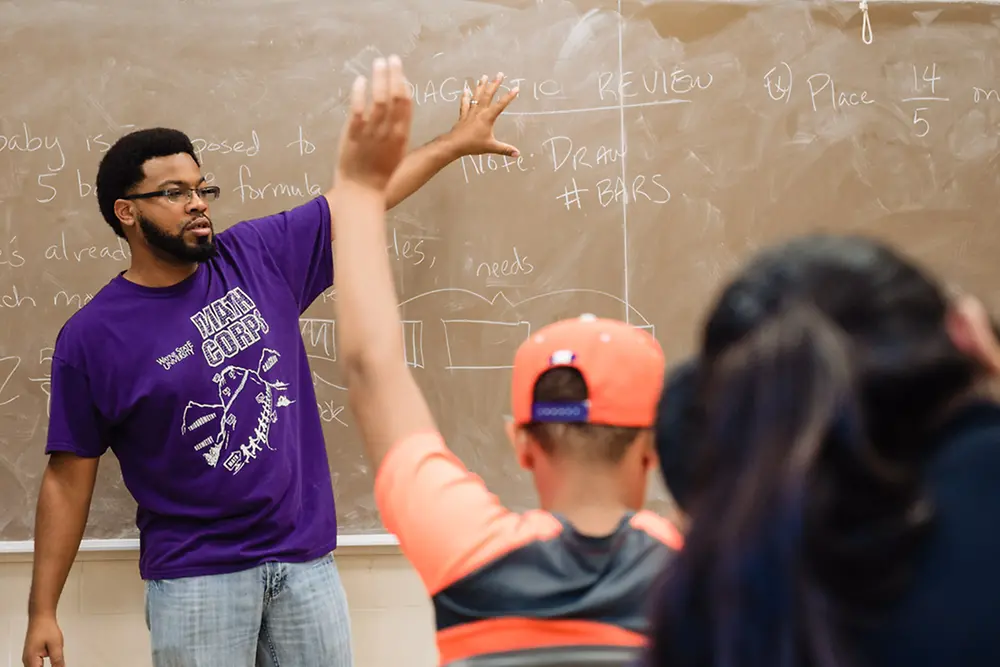Female empowerment begins with each and every one of us: We must practice what we preach, at work and at home with our families. Not just for ourselves, but also for the next generations. That also means making our own decisions and not letting anyone influence us when it comes to having both a family and a career.
I’m firmly convinced that, as a working mother, I have a positive impact on the values of my two sons and thus contribute indirectly to female empowerment that way. On some subconscious level, my sons’ future spouses will no doubt be grateful to me for this.
“Female empowerment is the key to taking on the challenges that women face around the world.”
Equal opportunities for women and girls are not guaranteed in many countries. Have you noticed any specific causes for this in different countries?
So far, I’ve seen three main phenomena: Families often can’t afford the tuition fees that, unlike here in Germany, have to be paid to attend school in many countries. Sometimes, girls have to start working at an early age to earn money and support their families.
In many countries, cultural factors also lead them to believe that they are worth less than men – and they end up behaving as if that were true. “You don’t stand a chance” is the key phrase that inspired us for Schwarzkopf Million Chances and eventually moved us to launch the initiative about two years ago.
What helps girls to become strong women?
Education, including learning how to read and write, should be a universal basic right for boys and girls alike. In my opinion, the way girls are raised is critical: are equal rights a matter of course to them? Do they have strong female role models to support them and help them find direction? It’s important for girls to be able to acquire traits like self-confidence, courage, a healthy dose of ambition and endurance.
Has any particular project in the last two years stuck in your memory?
At the start of 2018, I was in Port-au-Prince in Haiti, one of the world’s poorest countries, where the population is still suffering from the aftermath of earthquakes and tropical storms, and where pollution from plastic waste is omnipresent. Women there live at the breadline and often have to take care of themselves and their children on their own. In partnership with the social enterprise Plastic Bank, we opened collection centers on the island where women can exchange the plastic waste they’ve collected for cash, charcoal bricks for cooking or electricity for their mobile phones. This way, plastic waste becomes a currency – and the environment is rid of plastic pollution in the process. It also fosters women’s independence and self-esteem, because the extra income allows them to improve their lives and those of their children.
People in Haiti can collect plastic waste in exchange for money or social services.
Another project under the umbrella of the Million Chances initiative is “Shaping Futures.” What is that about?
Shaping Futures is an amazing initiative that gives underprivileged youth access to training in the basic techniques of professional hairdressing. The project by Schwarzkopf Professional and SOS Children’s Villages thereby allows young adults to build a better future and an independent life for themselves. Thanks to the passionate, voluntary engagement of our numerous hair stylists and employees, more than 2,200 hairdressers have already been trained in 30 countries since the project began in 2010.
Zinhle Evelyn Dlamini (pictured above) from South Africa is one of the many women who benefitted from the “Shaping Futures” program.
Last year the Million Chances Award was presented. What are those all about?
Aside from cooperating with Plastic Bank, our initiative draws additional strength from partners like Plan International and impacts women and girls who face the most hardship and discrimination around the world – including in China, Colombia, and Egypt. However, there is also a lot to be done on our own doorstep. The Million Chances Award was created to recognize non-profit initiatives or projects in Germany, Austria and Switzerland that operate in the fields of education, economic emancipation, rights and integration, or even healthcare for women and girls.
The winners of the 2018 Million Chances Award were recognized for their contributions towards helping women succeed.
“There are many places where women are told that they are worth less than men – and that has lasting impacts.”























